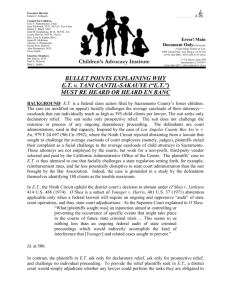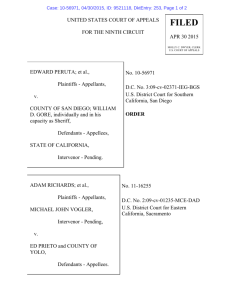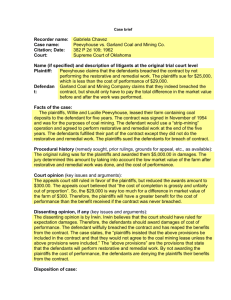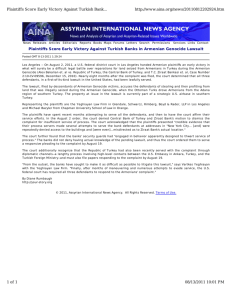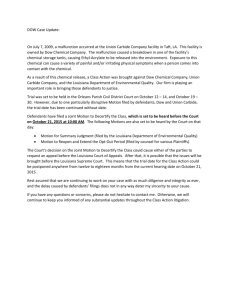in the superior court of the state of delaware in and for new castle
advertisement
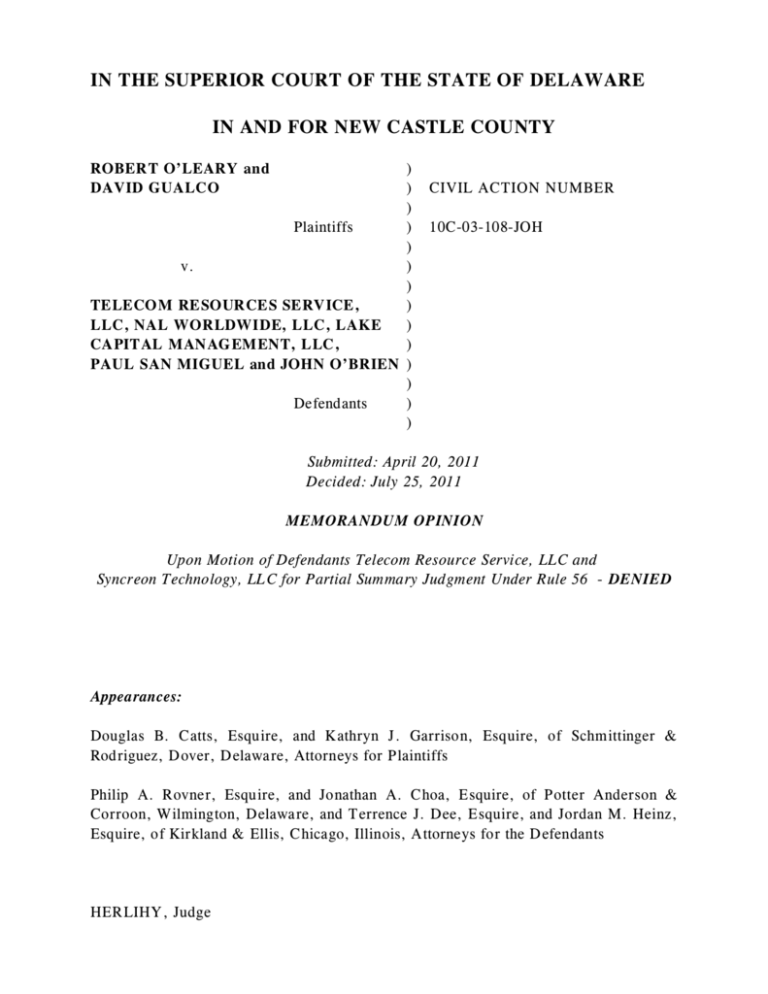
IN THE SUPERIOR COURT OF THE STATE OF DELAWARE IN AND FOR NEW CASTLE COUNTY ) ) ) Plaintiffs ) ) v. ) ) TELECOM RESOURCES SERVICE, ) LLC, NAL WORLDWIDE, LLC, LAKE ) CAPITAL MANAGEM ENT, LLC, ) PAUL SAN MIGUEL and JOHN O’BRIEN ) ) Defendants ) ) ROBER T O’LEARY and DAVID GUALCO CIVIL ACTION NUMBER 10C-03-108-JOH Submitted: April 20, 2011 Decided: July 25, 2011 MEMORANDUM OPINION Upon Motion of Defendants Telecom Resource Service, LLC and Syncreon Technology, LLC for Partial Summary Judgment Under Rule 56 - DENIED Appearances: Douglas B. Catts, Esquire, and Kathryn J. Garrison, Esquire, of Schmittinger & Rodriguez, Dover, Delaware, Attorneys for Plaintiffs Philip A. Rovner, Esquire, and Jonathan A. Choa, Esquire, of Potter Anderson & Corroon, Wilmington, Delaware, and Terrence J. Dee, Esquire, and Jordan M. Heinz, Esquire, of Kirkland & Ellis, Chicago, Illinois, Attorneys for the Defendants HERLIHY, Judge Plaintiffs Robert O’Leary and David Gualco (“plaintiffs”) have sued various defendants for breach of contract, fraudulent inducement, bad faith and other causes of action. Two of the defendants, Telecom Resource Service LLC (“TRS”) and Syncreon Technology (f/k/a NAL Worldwide LLC) (collectively the “defendants”) filed a counterclaim against plaintiffs for breach of contract. Their counterclaim arises from a lawsuit plaintiffs originally brought in California against these defendants raising similar grounds. The contracts at issue between these parties required any lawsuits to be filed in Delaware. Accordingly, a California Superior Court dismissed plaintiffs’ action for improper venue. Defendants, though they initially sought to pursue a procedure available to them under California law to recover attorney’s fees and costs in cases of such dismissal, did not pursue it. Instead, they now claim the same fees and costs through their breach of contract counterclaim. Plaintiffs assert here, as they did in California, that they were fraudulently induced into these contracts, thus voiding them, and voiding the forum selection clause resulting in no liability on this counterclaim. Nevertheless, the defendants have moved for partial summary judgment on their counterclaim. The Court finds the defendants had two inconsistent remedies available to them. Their failure to pursue the process to recover fees to which they may have been able to recover constitutes a waiver of the remedy they invoked. As such, they cannot now recover the same damages in their breach of contract action. 1 Facts Plaintiffs sold their business, Telecom Resource Service, LLC to TRS Acquisition LLC (now defendant “TRS”), a solely-owned subsidiary of NAL, created to purchase plaintiffs’ business. As part of their sale of TRS to NAL, plaintiffs signed an Asset Purchase Agreement (“APA”) and Senior M anagement Agreements (“SMAs”) with defendants. The APA was the agreement for the sale of Telecom Resource Service, LLC. The SMAs were the contracts designating O’Leary and Gualco as vice presidents and employees of the new TRS. 1 Plaintiffs received a $1,000,000.00 purchase price, and a contract from TRS retaining their services to continue to run the company. On November 11, 2008, plaintiffs w ere terminated, allegedly for cause, from their positions as vice presidents of TRS. TRS claimed that they were operating several business ventures in violation of their SM As, particularly with regard to resale of certain telecom munications equipment which was supposed to be recycled. Plaintiffs claim that the resale of this equipment, which was actually their own personal property, was not prohibited in either the SMAs or the APA , and therefore they were wrongfully discharged in breach of their employment contracts. When responding to plaintiffs breach of contract action in California, defendants TRC, NAL, Lake Capital M anagement, LLC, Paul San Miguel and John O’Brien moved to dismiss based on improper venue. In their motion they stated, “In addition to dismissal 1 Compl. ¶16. 2 of (the California) action, Defendants seek their attorney’s fees and costs incurred in bringing this Motion, and such other relief as this Court deems necessary and just.” 2 On December 17, 2009, the California Superior Court granted the California defendants motion to dismiss.3 Under California procedure, which the Delaware defendants do not dispute, they then had the ability to file for fees and costs. They did not do so. These same defendants now have included here as a counterclaim a breach of contract for violating the forum selection clause and seek the same damages they did not pursue as they could have in California. Parties’ Contentions Defendants first argue that by filing their action in California, plaintiffs have breached the APA and the SMAs, and should be held liable for said breach. They contend that the California court ruled and plaintiffs admitted that under the APA, the parties agreed to “irrevocably submit []to the exclusive jurisdiction of the United States District Court or the Delaware State Court located in Wilmington, Delaware, in respect of any claim relating to the interpretation and enforcem ent of [the APA]. . . .” 4 Under the SMAs, the parties also agreed to the same jurisdiction, and also agreed to submit to 2 Plaintiffs’ response to defendants motion for partial summary judgment, Exhibit L. 3 Id.; Ex. N. 4 Defs.’ Ex. A §7.16 (APA). 3 arbitration in Chicago for certain employment related disputes.5 Since plaintiffs filed suit in California, defendants argue that they are liable for a breach of the forum selection clauses, and must pay the fees and expenses incurred in defending the California action. Plaintiffs offer several arguments, two of which potentially raise issues of material fact precluding summary judgment. First, they claim the an enforceability of this forum selection clause falls under one of the two exceptions to the rule that such clauses are generally enforceable, that is, that assent to the contract was obtained via fraudulent inducement thereby voiding it. 6 They claim that the California court which dismissed the suit as improperly filed did not make a substantive determination as to whether plaintiffs’ case fell under this exception, leaving the issue not fully litigated and an issue of material fact. 7 Second, plaintiffs claim there is still an issue of material fact as to whether defendants are liable for the initial material breach of the contracts, which would excuse plaintiffs any alleged subsequent breach of the forum selection clause caused by filing in California.8 Third, plaintiffs also argue that defendants waived their rights to seek costs and attorneys fees when they did not file a memorandum of costs or a motion for 5 Defts.’ Ex. B §12.11 (SMA). 6 Prestancia Mgmt. Grp. Inc. v. Va. Heritage Found, II LLC, 2005 WL 1364616 (Del. 7 Pls.’ Resp. at 2. 8 Pls.’ Resp. at 3. Ch.). 4 attorney’s fees within the requisite filing period required under California Rules of Court. 9 At oral argum ent on this motion, plaintiffs’ third argum ent, prompted the Court to order supplemental briefing on the issue of whether defendants were entitled to an election of remedies. That is, whether defendants had a choice regarding whether they would seek fees and costs from the California action available under the California Rules of Court, or whether they were entitled to also seek recovery as damages for the California action as part of a counterclaim for breach of contract in the Delaware action. Defendants argue that they are entitled to an election of remedies from either the California Code provisions cited by plaintiffs or under a breach of the forum selection clause action in this court. They also contend that their decision to seek this remedy in Delaware instead of California is consistent with the forum selection clause, and that requiring them to recover in California is unduly prejudicial to them. Plaintiffs contend that defendants are not seeking an election of inconsistent remedies, but rather an election of jurisdiction in which to recover one remedy - the recovery of their attorney’s fees from the California action. Additionally, plaintiffs argue that even if defendants arguably were pursuing a genuine election of remedies, a statutory provision (such as the California Rules at issue) can render a party’s remedy exclusive. Because defendants did not pursue this exclusive remedy, they are barred by res judicata from now bringing a claim for remedies in the California action in this Court. 9 Id. 5 Applicable Standard Summary judgment may only be granted where there are no genuine issues of material fact and the moving party is entitled to judgment as a matter of law.10 The moving party has the initial burden of proving that no genuine issue of material fact exists, and that he or she is entitled to summary judgment. 11 The Court must view the evidence in the light most favorable to the non-moving party.12 If a material fact is in dispute, or if it seems desirable to inquire m ore thoroughly into the facts in order to clarify the application of law, summary judgment is inappropriate.13 Thus, if it appears that there is any reasonable hypothesis by which the non-moving party might recover, the motion for summary judgment will be denied.14 Fraudulent Inducement A general claim of fraudulent inducement as to the whole of a contract is insufficient to invalidate the forum selection clause contained within the contract. To deem the forum selection clauses unenforceable under fraudulent inducement, plaintiffs w ould have to prove that the agreement to the forum selection clauses themselves were obtained via fraudulent inducement: 10 Windom v. Ungerer, 903 A.2d 276, 280 (Del. 2006). 11 Brzoska v. Olson, 668 A.2d 1355, 1364 (Del. 1995). 12 Id. 13 Ebersole v. Lowengrub, 180 A.2d 467, 470 (Del. 1962). 14 Vanaman v. Milford Mem’l Hosp., Inc., 272 A.2d 718, 720 (Del. 1970). 6 To invalidate a forum selection clause on the grounds of fraud, the party seeking to invalidate the clause must dem onstrate that the clause itself was procured by fraud. Unless there is a showing that the alleged fraud or misrepresentation induced the party opposing the forum selection clause to agree to inclusion of that clause in the contract, a general claim of fraud or misrepresentation as to the entire contract does not affect the validity of the forum selection clause.15 The law is clear. The forum selection clauses contained in the SMAs and APA are not voidable under the theory that plaintiffs were fraudulently induced to sign those contracts as a whole. Plaintiffs have not presented undisputed facts, or any facts, demonstrating that they were fraudulently induced to include Delaware forum selection clauses in the APA and SMAs, and a claim that they were fraudulently induced to enter the contract as a whole is insufficient to invalidate the forum selection clauses. Election of Remedies Under California law, “a prevailing party is entitled to recover costs, including attorney’s fees if provided for in a contract, as long as that party files a memorandum of costs within 15 days after dismissal by the court, or within 180 days after entry of judgment, whatever is first.” 16 If the attorney’s fees are not fixed under a contract, then a notice of motion to claim attorney’s fees must be served and filed within the time for 15 Double Z Enterprises, Inc. v. Gen. Mktg. Corp., 2000 WL 970718 at *3 (Del. Super.). 16 Cal. Code Civ. Pro. §1032, 1033.5(a)(10); Cal. Rules of Court, R. 3.1700(a)(1). (Pls.’ Ex. J and K). 7 filing a notice of appeal. 17 A notice of appeal must be filed on the earliest of 60 days after a “Notice of Entry” of judgment is served on the parties, or 180 days after entry of the judgment. 18 Plaintiffs argue that since the defendants did not file such a claim for costs and attorneys’ fees, they do not now have recourse in this Court to recover the fees and costs associated with defending themselves in the California action. They argue the issue of attorneys fees was fully adjudicated, if not waived, in California and barred from consideration in this Court by res judicata. Defendants argue that this is not the sole remedy that they were permitted to pursue upon the dismissal of plaintiffs’ case from the California court, and that suing for a breach of contract in Delaware is more consistent with the forum selection clause in the contracts at issue. The doctrine of election of remedies is “that where a plaintiff has two ‘inconsistent remedies’ available for redress of a single right, he must elect one of those remedies.” 19 Further: Under the doctrine of election of remedies, a party who has two or more inconsistent remedies available, and elects to pursue one of them to the exclusion of the others, may not later pursue other inconsistent remedies. 20 A party is said to have elected a remedy when he makes any decisive act, with knowledge of his rights and of the facts, indicating an intent to pursue 17 Cal. Rules of Court, R. 3.1702(b)(1) (Pls.’ Ex. K). 18 Cal. Rules of Court, R. 8.104 (a)(1), R. 8.104(a)(3)(Pls.’ Ex. K). 19 Elysian Fed. Sav. Bank v. Sullivan, 1990 WL 20737 at *3 (Del. Ch.). 20 Scott v. City of Harrington, 1986 WL 4494 at *1-2 (Del. Ch.), citing Sannini v. Casscells, Del.Supr., 401 A.2d 927 (Del. 1978)(emphasis added). 8 one remedy rather than the other. One decisive act that constitutes such an election is the prosecution of a claim to a final judgment or decree.21 The commencement of an action, seeking one of the inconsistent remedies, has also been regarded as a decisive act constituting an election.22 When first sued in California the defendants had two remedies available to them. They do not dispute the existence of these remedies. As a matter of fact, in their response to plaintiffs’ law suit in California, they specifically stated they would be seeking attorney’s fees and costs after dismissal. Their other remedy is the one they are seeking here, namely damages for breach of contract. The California remedy is unique to that state and not replicated here. Defendants, however, after commencing an action for attorney’s fees and costs failed or chose not to follow-up on the California remedy. Under the circumstances, this Court views that as a waiver, but not a reservation of being able to pursue the breach remedy here. For reasons known only to them, they did not pursue the remedy they were granted and to which they were entitled. This Court views the two remedies as inconsistent. One is of statutory/procedural creation not available here. Defendants invoked that remedy through their California motion to dismiss. They cannot now seek the award they waived by failing to claim it 21 Scott v. City of Harrington, 1986 WL 4494 at *1-2 (Del. Ch.), citing Stoltz Realty Co. v. Raphael, 458 A.2d 21, 23 (Del.1983). 22 Scott v. City of Harrington, 1986 WL 4494 at *1-2 (Del. Ch.), citing Taylor v. Robertson Petroleum Co., 137 P.2d 150, 155. 9 within the time period specified by California law after a dismissal. 23 Primary Breach of Contract Assuming arguendo that even if the defendants were permitted to bring a claim for fees under the guise of a breach of contract action in this Court, there would remain an issue of material fact as to whether defendants were the first party to materially breach the APA and SM As, thereby excusing plaintiffs’ lack of performance under them. Defendants are not merely requesting attorney’s fees; instead, they are requesting a motion for summ ary judgment as to whether plaintiffs breached the APA/SMAs by filing their complaint in California Court. The first party who materially breaches a contract cannot dispute the other party’s subsequent failure or refusal to perform.24 Therefore, if the finder of fact in this Court determines that defendants first breached the APA and SMAs against plaintiffs, the core issue disputed in this case, plaintiffs would not be bound to perform under the contract provisions, not be liable for im properly bringing the suit in California, and therefore not be liable for attorney’s fees and costs incurred by defendants in that action. A determination at this stage that plaintiffs breached the contracts by filing in California is premature, and defendants cannot recover for such in a motion for summ ary judgment. 23 For the history and rationale of these California Rules of Court, See, Sanabria v. Embrey, 92 Cal. App. 4th 422 (Cal. Ct. App. 2001). 24 Hudson v. D & V Mason Contractors, Inc., 252 A.2d 166, 170 (Del. Super. 1969). 10 Conclusion For the reasons stated herein, defendants motion for partial summ ary judgment is DENIED. IT IS SO ORDERED. J. 11
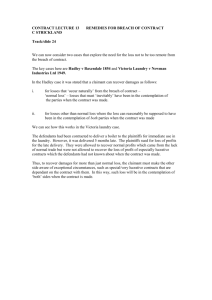
![[Click and Enter Attorney Name], State Bar No - E](http://s3.studylib.net/store/data/007177564_1-4d9407aff5e1ecb2a5922cd955484ee2-300x300.png)
